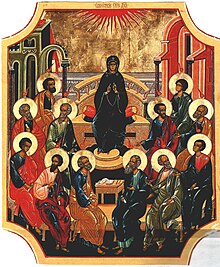
Back Глосолалия Bulgarian Glossolàlia Catalan Glosolálie Czech Tungetale Danish Zungenrede German Γλωσσολαλιά Greek Glosolalio Esperanto Glosolalia Spanish Glossolaalia Estonian Kielilläpuhuminen Finnish

Speaking in tongues, also known as glossolalia, is an activity or practice in which people utter words or speech-like sounds, often thought by believers to be languages unknown to the speaker. One definition used by linguists is the fluid vocalizing of speech-like syllables that lack any readily comprehended meaning. In some cases, as part of religious practice, some believe it to be a divine language unknown to the speaker.[1] Glossolalia is practiced in Pentecostal and charismatic Christianity,[2][3] as well as in other religions.[4][5]
Sometimes a distinction is made between "glossolalia" and "xenolalia" or "xenoglossy", which specifically relates to the belief that the language being spoken is a natural language previously unknown to the speaker.[6]
- ^ Colman, Andrew M., ed. (2009). "Glossolalian". A Dictionary of Psychology. Oxford University Press. Retrieved 5 August 2011.
- ^ Lum, Kathryn Gin; Harvey, Paul (2018). The Oxford Handbook of Religion and Race in American History. Oxford University Press. p. 801. ISBN 978-0190856892.
... would prove influential on the development of black Pentecostalism in the early twentieth century, as glossolalia, or speaking in tongues, would be understood as a third work of grace following Holiness and receipt of the Holy Spirit.
- ^ The Encyclopedia of Christianity. Wm. B. Eerdmans Publishing. 1999. p. 415. ISBN 978-9004116955.
While in Houston, Texas, where he had moved his headquarters, Parham came into contact with William Seymour (1870–1922), an African-American Baptist-Holiness preacher. Seymour took from Parham the teaching that the baptism of the Holy Spirit was not the blessing of sanctification but rather a third work of grace that was accompanied by the experience of tongues
- ^ Rose, Seraphim (1997). Orthodoxy and the Religion of the Future. St Herman Press. p. 137. ISBN 188790400X.
There is scarcely to be found an example of "speaking in tongues" in any even nominally Christian context for over 1,600 years after the time of Paul...and yet this "gift" is possessed by numerous shamans and witch doctors of primitive religions, as well as by modern spritistics mediums and the demonically possessed.
- ^ Whelan, Christal (2007). "Shifting Paradigms and Mediating Media: Redefining a New Religion as "Rational" in Contemporary Society". Nova Religio. 10 (3): 54–72. doi:10.1525/nr.2007.10.3.54.
- ^ Cheryl Bridges Johns and Frank Macchia, "Glossolalia", The Encyclopedia of Christianity (Grand Rapids, MI; Leiden, Netherlands: Wm. B. Eerdmans; Brill, 1999–2003), 413.
© MMXXIII Rich X Search. We shall prevail. All rights reserved. Rich X Search